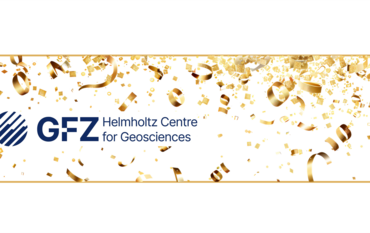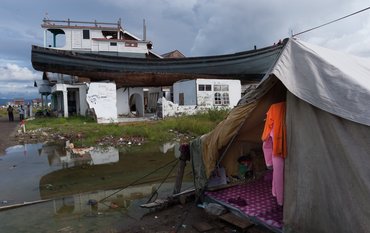At the German Geothermal Congress 2024 in Potsdam, the German Research Centre for Geosciences (GFZ) was involved in many different programme items as the main science partner. These ranged from a plenary lecture at the opening of the congress, participation in the panel discussion and excursions to geothermal projects in the region and to the GFZ laboratories, to various lectures and poster presentations and a GFZ information stand in the exhibition accompanying the congress. The event took place from 22 to 24 October 2024 at the Kongresshotel Potsdam and was organised by the German Geothermal Energy Association. GFZ researchers were particularly successful in the Science Bar, the poster competition for young researchers: M.Sc. Lioba Virchow, PhD student from Section 4.3 ‘Geoenergy’, and M.Sc. Mikhail Tsypin, PhD student from Section 4.5 ‘Subsurface Process Modelling’, won, M.Sc. Johannes Hart, PhD student from Section 2.2 ‘Geophysical Imaging of the Subsurface’, reached the final.
Background: The German Geothermal Congress 2024
The annual congress brings together experts from industry, research and politics, local authorities and associations. With around 1,200 participants, the three-day event is the largest geothermal industry gathering in Germany. On two congress days and one workshop day, an intensive exchange on the current state of development of geothermal energy took place in various formats. A wide range of topics from industry and research were covered, including deep, medium-depth and near-surface geothermal energy as well as the storage of heat and cold underground.
This year, France was the partner country of the DGK: it presented its extensive expertise in order to advance the energy transition through a transnational exchange.
Participation of the GFZ as main scientific partner
The GFZ is traditionally represented on the scientific committee of the conference. As the main scientific partner, the GFZ was prominently represented in the conference programme this year in various formats. Prof. Dr Ingo Sass, Head of the GFZ Geoenergy Section, gave a plenary lecture on the topic of ‘Geothermal energy between application and research’ in the opening session.
In his presentation, he discussed the great potential of geothermal energy and highlighted the upcoming challenges in petrothermal and hydrothermal geothermal energy as well as the need for accompanying research: "With today's technology, we would be able to cover almost all of Germany's heating requirements with geothermal energy alone. Close co-operation between research and industry is an important prerequisite for this. Research needs access to boreholes and data obtained in commercial projects. Industry needs rapid access to innovations and technological developments from research," said Sass.
Ingo Sass was also a participant in the panel discussion with, among others, Ministerialdirigentin Kerstin Deller, Head of Division for Policy Issues Energy Efficiency and Heat at the Federal Ministry for Economic Affairs and Climate (BMWK).
The GFZ also participated as a partner in various excursions: Energie und Wasser Potsdam GmbH (EWB) invited participants to visit the first deep geothermal heating plant in the state capital of Potsdam, a project that was scientifically supported by the GFZ. And in Berlin-Adlershof, visitors were able to visit the ‘GeoSpeicherBerlin’ real-world laboratory for the energy transition, in which the GFZ is cooperating with the leading BTB Berlin GmbH. The highlight of the tour of Potsdam's Telegrafenberg was the GFZ laboratories with the TrueTriax high-pressure facility inaugurated in the summer.
The GFZ was also represented at the exhibition accompanying the congress with an information stand and offered two workshops. In the workshop ‘Numerical Simulation of an Aquifer Thermal Energy Storage (ATES)’, participants learnt how the functioning of an ATES system can be mapped and evaluated numerically. In the interactive workshop of the Geoenergy Alliance Berlin-Brandenburg GEB2, the focus was on the development and optimisation of geothermal projects in the region. Various poster contributions provided further insights into geothermal research at the GFZ.
Double victory at the Science Bar
In the ‘Science Bar’ poster competition, organised by the ‘Young Geothermal Energy’ working group of the German Geothermal Energy Association, a renowned jury awarded prizes to two presentations for the first time this year. The winners were Lioba Virchow and Mikhail Tsypin, both from the GFZ. GFZ researcher Johannes Hart made it to the final. The competition is aimed at young scientists who would like to present their bachelor's, master's or doctoral theses on the subject of geothermal energy to a broad specialist audience.
About the award winners from the GFZ
Prize winner Lioba Virchow(Section 4.3 Geoenergy) is doing her doctorate in the field of aquifer thermal energy storage (ATES). Aquifers are permeable, groundwater-bearing rock layers. Virchow is investigating the reactivity of potential ATES reservoirs in the Muschelkalk and Hettang sandstone below the Rupelton layer in the Berlin area. Her research focusses on how the use as an aquifer heat reservoir affects the geochemical balance of the aquifer, what potential environmental impacts may be associated with this and how this in turn influences the operation of an ATES.
As part of the exploration and sidetrack drilling of the GeoFern and PUSH-IT heat storage research projects in Berlin-Adlershof, Lioba Virchow examined a 200 metres long core section and the associated cuttings using mobile X-ray fluorescence analysis. The aim was to identify reactive mineral phases and to assess how heterogeneous the Jurassic sandstone aquifers drilled through are.
Lioba Virchow presented the results of the measurement campaign as part of the poster presentation. The application of the presented method enabled the detection of heterogeneities such as clay contents, carbonates and iron mineral phases within the analysed aquifers. The results improve the geochemical understanding of the subsurface already during the drilling project and provide valuable information for well-founded decisions regarding further drilling planning and borehole development.
Prize winner Mikhail Tsypin (Section 4.5 Subsurface Process Modelling) is researching the interactions between groundwater dynamics and climate factors such as precipitation and surface temperature on a regional scale for the North German Basin as part of his doctoral thesis. Important applications of these results are, for example, the evaluation of water resources and the exploration of geothermal energy.
The poster presented the results of thermal-hydraulic simulations in the subsurface of the Berlin-Brandenburg region. These simulations link a data-based 3D geological model with hydroclimatic boundary conditions such as groundwater recharge or groundwater discharge. The model analyses the variations in the distance between the groundwater surface and the overlying terrain as well as the flow rates and the thermal field in the main reservoirs in order to determine where the fluid flow strongly influences heat transport.
Finalist Johannes Hart (Section 2.2 Geophysical imaging of the subsurface) is conducting research for his doctoral thesis as part of the GFK-Monitor project, which is developing fibre optic cable monitoring for geothermal systems. In particular, the aim is to optimise the efficiency and production safety of deep geothermal wells through the use of fibre optic monitoring technologies.
On his poster, Hart showed the first results of a distributed dynamic strain measurement (DDSS or DAS). It was carried out along a deep production well (3.7 km) and a deep injection well (4.1 km) for a geothermal project in Munich. By analysing the strain rate evolution, processes relevant for reservoir characterisation and well integrity assessment could be identified. One of the most exciting results was that it was possible to identify the inflows along the entire reservoir with unprecedented accuracy.
The GFZ congratulates the successful colleagues!








![[Translate to English:] Fire in a forest, smoke rising, aerial view from above](/fileadmin/_processed_/8/3/csm_2025_01_06_AdobeStock_415831729_5a0e6d50d3.jpeg)








![[Translate to English:] [Translate to English:] Abror Gafurov von dem Schriftzug "Welcome to Azerbaijan" und den UN und COP Logos](/fileadmin/_processed_/2/5/csm_2024_11_Baku_COP29_Abror_Gafurov_1042faec82.jpeg)


![[Translate to English:] Martin Herold standing in front of the library on the Telegrafenberg](/fileadmin/_processed_/c/d/csm_Martin_Herold_d385ee4dd9.jpeg)
![[Translate to English:] Many people are listening to a presentation in the GFZ lecture hall.](/fileadmin/_processed_/c/a/csm_1_Bild1_hell_b9c0e9f5ed.jpeg)






![[Translate to English:] Both scientists sitting on stools in front of a wall of books in the Telegrafenberg library](/fileadmin/_processed_/6/6/csm_Buiter_Castell_DORA_4_e87cb1ea18.jpeg)
![[Translate to English:] Gruppenbild mit 4 Personen](/fileadmin/_processed_/8/d/csm_20241017_GFZ-Emmerman-Medal-005_web_reinhardtundsommer_21a414fa4a.jpeg)






![[Translate to English:] Ice landscape with five red tents](/fileadmin/_processed_/8/9/csm_Zeltlager_auf_dem_Eis_Urheberin_Jenine_McCutcheon_5ced2d523b.jpeg)
